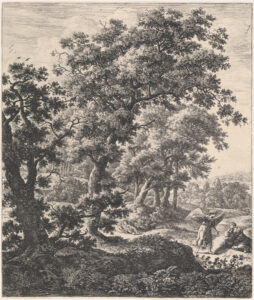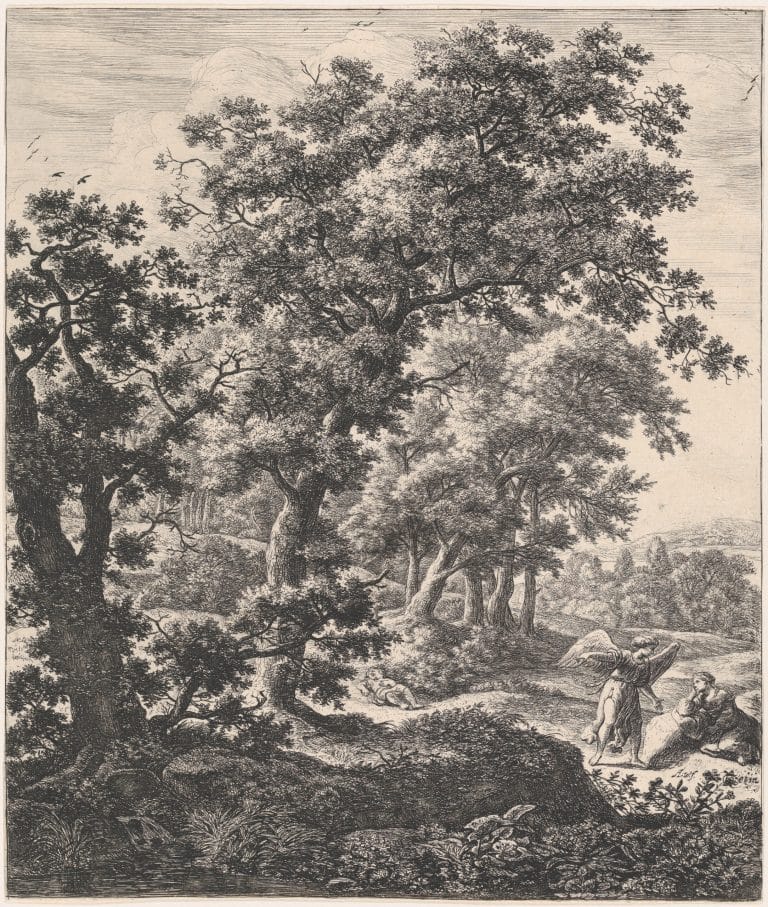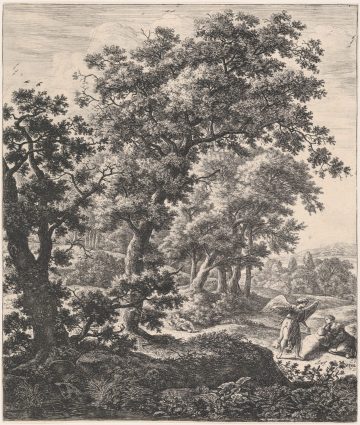
17th century,
Anthonie Waterloo
I love Hagar. The Old Testament is full of dramatic stories of difficult situations and Hagar is right in the middle of one. She was the enslaved woman that Sarai gave to Abram so that Sarai could have posterity. To frame why Hagar’s story tugs my heartstrings so strongly, I first want to tell a tender personal experience:
I was deep in the well of grief. My muscles ached from the hours I spent curled up on the couch. My safety net of support felt very threadbare—there had been a massive exodus where most of my closest friends, neighbors, and ward members moved away. And I was newly pregnant. I was often mentally and emotionally exhausted, doing the bare minimum of what I needed to do. There was one day that I forced myself to exercise for just five minutes. Doing that would at least allow me to feel like I had accomplished something that day. It took a gargantuan amount of effort to start and complete my “workout”. Afterwards, I was laying on the floor utterly drained, weeping from the effort. I thought about some of my friends who have dealt with depression. I thought about how proud they would be of me for doing something to take care of myself. I thought about how they would understand how much effort that took me, even though their life experiences were nothing like what I was currently going through. And then I thought about Jesus and the atonement. Whatever he experienced in the garden of Gethsemane was not exactly like what I was going through, but maybe it was an experience that allowed him to have perfect empathy with what I was facing. The thought that someone could completely understand what I was feeling brought me a deep level of peace and comfort. This incident has shaped my understanding of the gospel in profound ways that, even years later, I feel I haven’t fully explored.
The first time I encountered the story of Hagar after this experience was in Institute, when we were talking about Sarah. I was excited to read the scriptures with special consideration for a faithful matriarch of the Old Testament. (That’s how we tend frame things at church: the prophets and their wives are always amazingly faithful.) However, when I read through the story this time, the actions of Sarai and Abram disgusted me. I connected with Hagar’s story. In Genesis chapter 16, Sarai gives Hagar to Abram. Hagar quickly gets pregnant, and that swiftly strains the relationship between the two women. At some point, Sarai was so harsh that Hagar runs away.
Hagar is alone in the desert and resting at a well when an angel of the Lord comes and talks to her. He tells her that she needs to return to Sarai. (At first, I thought this sounded horrible, telling a slave to return to an abusive household. But the desert is also harsh, and this was probably solid advice to keep her alive.) The angel tells her that she will have a son and countless posterity. He tells her that she should name her son “Ishmael”, meaning “God hears”. He tells her that raising her son will not be easy. At the end of this experience, Hagar says “You are the God who sees me.” She named the well that she was at “the Well of the Living One who sees me”.
When I read Hagar’s story, I was struck with two thoughts:
-
how similarly we both experienced God. In our painful, isolated hour, we both felt seen by God.
-
how rarely that has happened to me while reading the scriptures.
The way she named God as the “God who sees me” feels powerfully right. I realized that Hagar’s experience qualifies her for the titles of prophet, seer, and revelator: she talked with God, she saw into the future, she told others about this experience. I’m so glad that someone listened to her and wrote it down. The God of Hagar is the God who saw her pain and suffering, the God who told her “You can do this hard thing”, the God who says “I hear you”. This is the God that I have experienced too.






9 Responses
Beautiful, and helps me see Hagar’s story in a new light. Thank you for sharing.
So beautiful. I love that you felt heard and seen.
I love the boldness of Hagar in naming God. It is a powerful story that is overlooked.
So lovely and wise. Thank you for this gift.
This is absolutely excellent. I have totally missed this in the past. TY
You’re welcome. Hagar is really left out of the church curriculum, so she’s easy to miss, unfortunately.
[…] Part 1 […]
[…] miss Kaylee’s beautiful interpretation of matriarch, Hagar, in The God of Hagar, Part 1 and Part 2 recently featured here on The Exponent. Hagar is mentioned perfunctorily in the Come […]
[…] Part 1, Part 2 […]